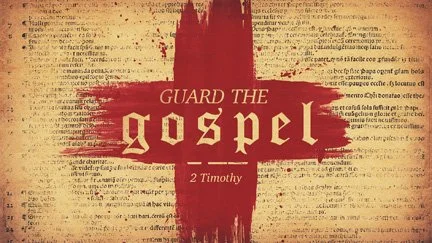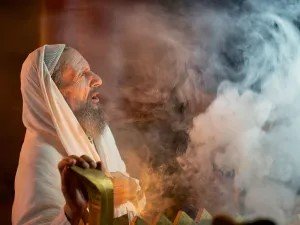John 3:1-17
Sometimes the most important conversations in your life happen without your planning for them. They just kind of sneak up on you. That’s what happened to me near the end of my 7th grade year in school. One day as I was leaving math class, my teacher, Elizabeth Derrick, asked me to come and see her after school. I was pretty sure I knew what she wanted; I had scored a 5 on my last test. That’s 5 out of 100.
So when the final bell rang, I made my way down to her classroom. But Mrs. Derrick didn’t even mention my last test. Instead, she asked me if I had signed up for my 8th grade classes yet; we all had been given a list of classes and a paper that had to be turned in at the end of the week. I hadn’t filled mine in yet. Mrs. Derrick then said, “I think you are very smart, Elisabeth. In fact, I think the reason that your work is so inconsistent is that you’re bored in your classes. I think you need more of a challenge. And I want you to sign up for honors classes next year. I believe you can do the work.”
I was stunned. My work – especially in her class – was inconsistent. On the previous test I had scored a 95. And I guess I knew that I was bored most of the day in school. So that night, I talked with my parents and told them what Mrs. Derrick had said, and we agreed that I would sign up for honors classes. And that decision changed my life forever. I flourished in the 8th grade and began to love school. I made very good grades through high school, college, and graduate school. And I kept in touch with Mrs. Derrick until she passed away. That one conversation proved to be a turning point in my life.
That’s what happened to Nicodemus that night when he went to talk to Jesus. He thought that he was going to have a nice academic discussion with another teacher, someone he was curious about and wanted to know more about. But instead, the conversation turned into something very different and life-altering. Jesus put before Nicodemus the very heart of the gospel message, the good news.
Nicodemus had impressive credentials. He was a Pharisee, someone who was an expert in Jewish law. He was a teacher of Israel, which meant that he knew and kept all of its rituals and practices. And he was a member of the Jewish ruling council, the Sanhedrin, which was the highest governing body of the Jewish people. Frederick Buechner calls him “a VIP with a big theological reputation to uphold.”
Brett Younger, a professor of preaching at the McAfee School of Theology at Mercer University, describes Nicodemus in more modern terms: Nicodemus is chair of the religion department and a mover and shaker in the ministerial association. He has a blog called ‘Religion for Grownups.’ Being a professional expert on God is good work if you can get it. Nicodemus is adept at articulating the intricacies of religion and detecting the logical shortcomings in other people’s faith … Nicodemus’ coming to see Jesus is surprising, because as far as the ministerial association is concerned, Jesus is a troublemaker. His only status with the local clergy is as a pain in the neck. Just last week he kicked over some tables during a big stewardship campaign at the temple. Nicodemus knows that there are social risks in coming to see Jesus; so he decides that with his reputation to uphold, it might be smart to pay his visit at night.
Nicodemus was a good man. We sometimes label the Pharisees as the bad guys, because of their conflicts with Jesus and the harsh words Jesus sometimes had for them. But the Pharisees were the ones who were highly concerned with obeying Jewish law (and making sure that other people did so); with doing all the things they were supposed to do, and not doing any of the things they were not supposed to do. And he was drawn to Jesus because he was curious about a man who was doing the things he was able to do, things that someone could not do unless God was empowering them to do it. And so he made up his mind to go and talk to Jesus, teacher to teacher, and find out what he was missing.
Nicodemus probably imagined two scholars sitting down to a friendly theological conversation, and his first words to Jesus seemed to pave the way for that kind of thing. But Jesus quickly turned the conversation down another path entirely: “Very truly I tell you, no one can see the kingdom of God unless he is born again.” As Frederick Buechner imagines the scene: That was all very well, Nicodemus said, but just how were you supposed to pull a thing like that off? How especially were you supposed to pull it off if you were pushing sixty-five? How did you get born again when it was a challenge just to get out of bed in the morning? He even got a little sarcastic. Could a man “enter a second time into his mother’s womb,” he asked, when it was all he could do to enter a taxi without the driver’s coming around to give him a shove from behind?
A gust of wind happened to whistle down the chimney at that point, making the dying embers burst into flame, and Jesus said being born again was like that. It wasn’t something you did. The wind did it. The Spirit did it. It was something that happened, for God’s sake. “How can this be?” Nicodemus said, and that’s when Jesus let him have it. Maybe Nicodemus had six honorary doctorates and half a column in Who’s Who, Jesus said, but if he couldn’t see something as plain as the nose on his face, he’d better go back to kindergarten.
Nicodemus wanted to have a nice conversation with Jesus, two teachers talking about matters of faith. But, as one commentator put it, he was out of his league and he knew it. He had a hard time connecting the dots as Jesus tried to explain it to him. He had the basics but couldn’t follow Jesus’ lesson. Maybe he was too literal-minded, and the metaphors were beyond him. The last words he uttered were, “How can this be?” And, after trying to explain it to him, Jesus finally sums it up by saying, “… the Son of Man must be lifted up so that everyone who believes in him may have eternal life. For God so loved the world that he gave his one and only Son, that whoever believes in him shall not perish but have eternal life.”
We don’t know whether or not Nicodemus understood any of that. The Gospel of John does not tell us what Nicodemus thought or felt as he left that night. Frederick Buechner imagines it like this: What impressed Nicodemus even more than the speech was the quickening of his own breathing and the pounding of his own heart. He hadn’t felt like that since his first pair of long pants, his first kiss, since the time his first child was born or the time they’d told him he didn’t have lung-cancer but just a touch of the flu. What we do know is that, after the crucifixion of Jesus, Nicodemus went with Joseph of Arimathea and asked for Jesus’ body; they anointed and prepared it for burial according to the customs of the Jews. As Buechner puts it: He went along with Joseph of Arimathea to pay his last respects at the tomb in broad daylight. It was a crazy thing to do, what with the witch-hunt that was going on, but he decided it was more than worth it. When he heard … that some of the disciples had seen Jesus alive again, he wept like a newborn baby.
At the very least, what that important conversation with Jesus gave to Nicodemus was a new kind of hope, the promise of a new kind of life. To live a kingdom of God life, Jesus said, meant that he would need a rebirth, a new identity. And I believe that Nicodemus found that rebirth, else why would he have shown up to care for Jesus’s body at the cross? In broad daylight? That one significant conversation changed Nicodemus’s life forever. It brought the good news to Nicodemus.
Over the next four weeks, we are going to break down the deep meaning in John 3:16, that good news that Nicodemus received. And we are going to hear that good news for ourselves all over again in new and deep ways. Listen for the voice of Jesus speaking to you during this Lenten season. Open your heart to the winds of God’s Spirit to move through you. Imagine a rebirth, a new life. It’s possible, even when you’re getting older. Even after you have been born again as a Christian, you continue to be transformed by the Spirit of God working in you. God continues to create new possibilities for and through you. God continues to show you how to live out the good news in the world.

























